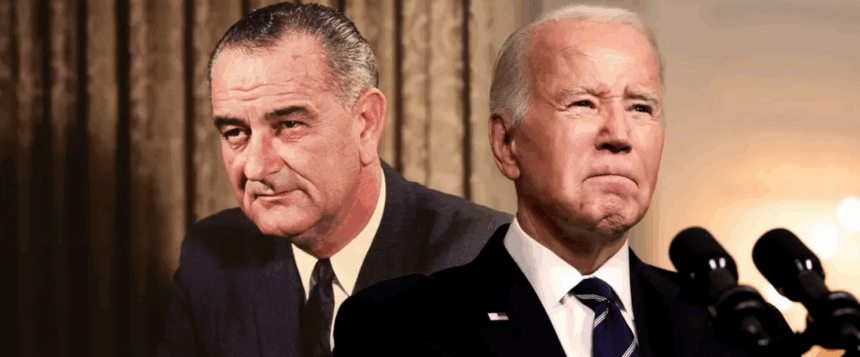On the night of April 15, 1967, the concourse at Manhattan’s Penn Station was clogged with sleepy, exhilarated teenagers waiting for the last train to Washington. We had just joined a column of marchers that stretched from Central Park to the United Nations—400,000 strong, though the next day’s New York Times would low-ball us at 100,000. Someone waved the early edition and shouted, “Johnson will have to listen to us now!”
He didn’t. President Lyndon Johnson escalated the slaughter in Vietnam and quietly widened it to Laos and Cambodia. For eight more years—and two presidencies—the war ground on. By the time the last helicopter skimmed the embassy roof in Saigon on April 30, 1975, Americans were not only finished with Vietnam; they were finished believing their government heeded their moral pleas.
The Lessons a War Machine Teaches
Polling numbers trace the arc of that broken faith. In 1965, only 24 percent of Americans called Vietnam a mistake; by 1971, the figure was 61 percent. College students moved even faster: Gallup found that by 1969, 69 percent wanted to slow or halt the war, while just 20 percent favored escalation—a mirror image of student sentiment two years earlier.
Yet opinion did not translate into policy. From half a million U.S. troops in 1968, Johnson and then Richard Nixon merely tapered the ground presence while unleashing the most ferocious aerial bombardment in history. The message to a rising generation was unmistakable: morality and majority sentiment are secondary when the machinery of war is humming.
Gaza: A Compressed Cycle of Disillusion
Fast-forward six decades and the cycle has compressed into months instead of years. When the Israel–Hamas war erupted in October 2023, the Biden administration responded with an open pipeline of U.S. weaponry. By June 2024, a CBS/YouGov poll found Americans opposing those shipments by 61–39 percent; among adults under 30, the gap was a stunning 77–23. On campus after campus, protests and encampments bloomed, and again the White House shrugged.
The parallel is not perfect—no U.S. troops are dying in Gaza—but the pattern is eerily familiar. Just as Johnson’s rhetoric about “peace with honor” masked an ever-widening killing field, President Biden’s talk of “iron-clad” security guarantees for Israel covers a policy that enabled siege warfare against 2.3 million Palestinians. The result is a new generation discovering, far earlier, how easily lofty American ideals buckle under the weight of strategic convenience.
Political Collateral Damage
In 1968, Vice President Hubert Humphrey, chained to Johnson’s war, stumbled into the presidential race and tried to pretend there was daylight between them. There wasn’t. Asked on Meet the Press to name a Vietnam-policy disagreement with the president, Humphrey praised “the soundness” of Johnson’s approach. He lost the youth vote—and the election—to Nixon.
In October 2024, history rhymed. Vice President Kamala Harris, pressed on The View to cite a single difference with Biden over the previous four years, replied: “There is not a thing that comes to mind.” Youth support cratered from 60 percent for Biden in 2020 to 54 percent for Harris last November—just enough to swing Michigan and Arizona into Donald Trump’s column.
Strategists will grumble that idealistic twenty-somethings always threaten to bolt. But in both 1968 and 2024, their alienation proved decisive. Young voters are not a mood; they are a margin of victory.
Why Washington Still Doesn’t Hear
Skeptics argue that Gaza is not Vietnam: no draft, fewer American coffins, greater geopolitical stakes in the Middle East. Fair enough. Yet the core dynamic endures. U.S. administrations of either party habitually equate military aid with influence and treat moral revulsion at civilian deaths as background noise—until it suddenly roars at the ballot box.
Students are especially quick to detect the dissonance. They sit in classes that extol the rules-based international order, then watch precision-guided bombs flatten refugee camps. They hear paeans to democracy while Israeli ministers openly dream of “voluntary migration” for Gazans. They absorb endless sermons on human rights only to learn that State Department lawyers massage the word “proportionate” into meaninglessness.
Is it any wonder encampments sprout on quads that, weeks earlier, were debating final-exam schedules?
What Comes Next
After Vietnam, Washington spent a decade nursing its “credibility gap” until the fever broke in the 1980s with Reagan-era swagger. Something similar will happen with Gaza, but the trajectory could be steeper. Social media collapses the distance between atrocity and witness; each strike on Rafah appears on a phone before the State Department finishes its talking points. In that environment, White House pleas for “context” sound like excuses.
The United States still has leverage—billions in arms that Israel cannot easily replace. A president willing to suspend shipments until humanitarian corridors open would command instant attention in Jerusalem. Instead, the administration clings to the fiction that private chiding will tame an Israeli government whose coalition is built on maximalism.
That choice has had moral and electoral costs. In 1967, thousands of us boarded trains believing our sheer numbers could force change. By 1971, we were marching less in hope than in witness, determined not to be silent accomplices. Today’s students seem already to occupy that latter stage. They protested not because they thought Biden would pivot, but because remaining quiet would make them complicit.
Listening While There’s Still Time
When a democracy stops listening, its youngest citizens learn to stop believing. Hubert Humphrey learned that lesson too late. Kamala Harris may be learning it now. Johnson believed older voters would offset student rage; Humphrey learned otherwise. Biden assumed Gaza would not eclipse inflation or abortion; Harris paid the price. Trump’s victory does not mean youth are newly hawkish—it means they felt unheard.
But the stakes extend beyond individual careers. A republic that repeatedly teaches its idealists that morality is irrelevant should not be surprised when they repay the compliment at the polls—or in the streets.
Vietnam showed that it can take years for Washington to catch up with public conscience. In Gaza, the clock is ticking much faster, and the sound you were hearing was not just protest chants—it was the erosion of faith that democratic consent still matters in matters of war and peace.
America ignores that drumbeat at its peril.
By: Geopolist | Istanbul Center for Geopolitics







